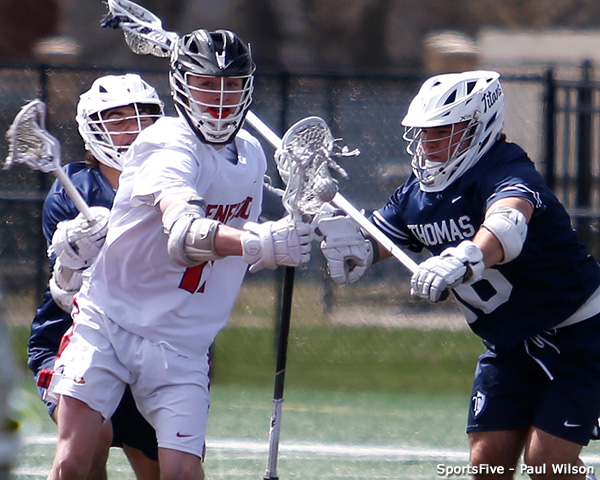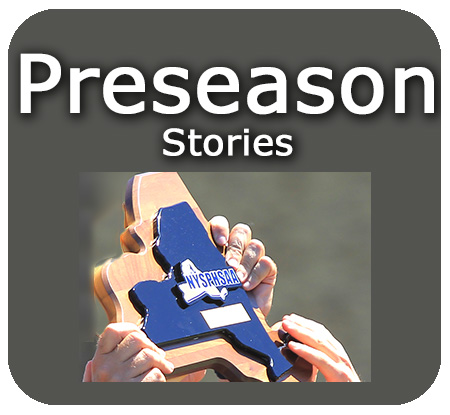


Section Five Lacrosse Hosts Leadership Symposium
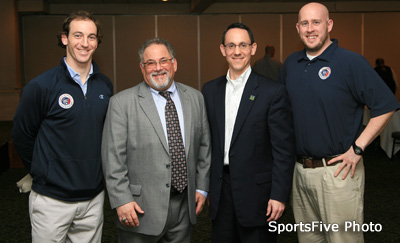 For the first time, Section Five Lacrosse hosted a leadership symposium for coaches and leaders from both boys and girls teams yesterday at the Burgundy Basin Inn in Pittsford.
For the first time, Section Five Lacrosse hosted a leadership symposium for coaches and leaders from both boys and girls teams yesterday at the Burgundy Basin Inn in Pittsford.
The creation of Boys Chairman, Mike Simon, all Varsity Head Coaches from the thirty-seven boys teams and the thirty-three girls teams were invited to select two leaders to attend the luncheon with their coach. There, they heard a number of speakers tell their stories and give advice about leadership.
Mike Simon welcomed the group of over one hundred and twenty-five participants in attendance. "What you are going to hear today from these great practitioners can carry over not only to your school, not only to your teams, but into the community." After his welcome he introduced Nate Snyder, Rochester Chapter President of US Lacrosse and Vice President and Assistant General Manager of the Rochester Rattlers, who served as the Master of Ceremonies.
Nate explained that among the goals for the day was "to identify a leadership project and to create an action plan...so that when you leave here you can take it back to implement with your school, team and community."
The first speaker was well known to the boy's lacrosse community. Coach John Johnson, Head Coach at St. John Fisher College since 2006, is starting his forty-third year as an athletic coach. In his twenty-six years with Canandaigua lacrosse he compiled a 357-149 record while winning thirteen Finger Lakes Championships, six Section V Championships and four Western Regional Titles. He was named Finger Lakes Coach of the year seven times and in 2008 he was inducted into the Rochester Chapter of US Lacrosse Hall of Fame.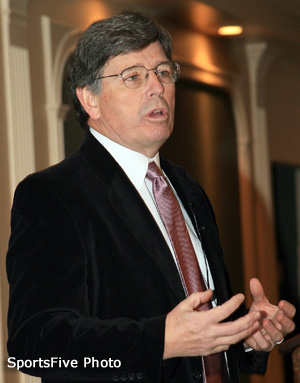
"Leadership deals with influence. I think you should have the people with the most positive influence [run] your team," Johnson said at the start of talk. He also stressed the need for goal setting of all kinds. Attainable goals, "stretch goals", seasonal goals and the like are needed and he suggested that the team leaders should be very involved in setting the goals. "You have to have input from your leaders to develop goals and also to develop standards [with them]." Johnson stated that he wants leaders to be influential on the field, in the weight room, in the classroom and in social areas.
"Captains need to accept responsibility", he stated. The exciting parts of being a leader are easy, but the tough parts are hard. "You want your leaders to be the ones who can help you.... I want leaders who can come to me and say, Coach we have a significant problem that you need to deal with, and not just shove [the problem] under the rug." There are rewards, risks and responsibilities that need to be accepted by leaders. The leaders need to exhibit qualities of commitment, confidence, composure and character and they need to be vocal as they build confidence among their teammates, refocus the team when needed and build the team up throughout the season.
Sometimes, Johnson said, leaders have to be enforcers. "When things aren't going well, there's got to be an enforcer. You're out at night and you see some of your teammates are doings things they should not be doing. Instead of, as a leader, turning your back, we would hope that the leaders would go up and say, 'This is unacceptable. You can't do this. You are hurting your team. You are hurting the whole component of what we're trying to do, so don't do it.'"
Johnson talked about how leaders are used in the St. John Fisher program. While leaders on and off the field, they help run testing days, they set up collages, used to help players get to know each other. They help prepare goal sheets. They run team contests. They are leaders in running community service projects and help in fundraising and creating bonding experiences.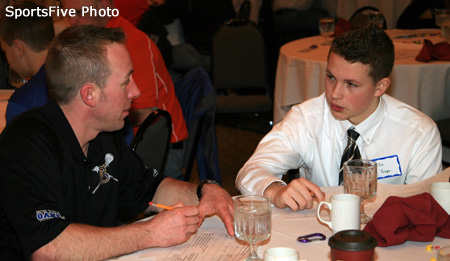
Johnson ended his remarks with a message to leaders. "Take chances. Be great. Great leaders, you set yourself up for success and that's what you want to do."
Educator, Coach and Section V Lacrosse Committee member, Karen Simon, then took over and led the group in the first of three group exercises throughout the symposium designed to help the coaches and their leaders create potential projects for their teams. Each group brainstormed looking for problems, challenges and opportunities for their team, their school and their community. After discussion, each group worked to pick one of the ideas for future work.
After the lunch break, Nate Snyder introduced Linda Michele, Head Coach of the Women's team at St. John Fisher College since 2012. She has led the team with two conference championships and NCAA appearances. Before SJF she led the Brockport program to NCAA tournaments and was named NCAA Coach of the Year. Before entering the college ranks, Michele was the Head Coach at the East Rochester women's team where she compiled a 160-40 record. Over thirteen years with the Lady Bombers she won four Section V Championships and made the NYS finals three times. In 2008 she was inducted into the Rochester Chapter of US Lacrosse Hall of Fame.
Before starting her remarks Michele asked each student to write down a team they have played on, the name of the leader of that team, and what they felt were the duties of a Captain. After giving the players and coaches some time to write down their thoughts, Michele read a quote from Helen Keller and then listed "twelve simple tasks" for leaders.
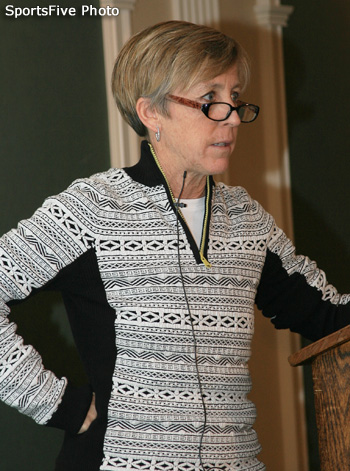 1 - Be the hardest worker at practice today. "Did I set the example that I want my peers to follow? Did I bring it every day?"
1 - Be the hardest worker at practice today. "Did I set the example that I want my peers to follow? Did I bring it every day?"
2 - Be a spark of energy and enthusiasm today. Noting that there are a great many distractions during the day, Michele reminded the student-athletes that they must "be mindful of the opportunity to compete, because before you know it the game is gone."
3 - Model mental toughness today. Michele suggested that leaders need to bounce back quickly from adversity and to maintain poise and optimism even when mistakes happen. "When you think back, some of the things you learned the most from it is the adversity that you had to work through to get that far."
4 - Connect with a teammate today. "The relationship building you do each day will pay off immeasurably down the road. Make a point, leaders, to involve everyone on your team."
5 - Compliment a teammate today. "Praise the actions and attitudes you want to see on your team." Michele recounted that a few years ago, she decided to end practice with each member of the team stating a compliment to another teammate. Acknowledging that it was difficult in the beginning, she said that it really makes a difference now that players are used to the practice. "Too many times in the world that we live in it's so easy to find the bad in people. It's amazing to hear the {positive] things they realize, how they will find a thing that a player did [well]."
6 - Challenge a teammate today. "Good leaders consistently invite, inspire, and sometimes implore others to greatness."
7 - Support a teammate today. "Good leaders are consistently on the lookout for teammates who might be struggling and [are} ready to offer an ear to listen, an encouraging word, a pat on the back or a shoulder to cry on."
8 - Constructively confront negativity, pessimism and laziness today. "As a leader, have the courage to confront [these things] that will crop up from time to time. We all have times when we hit a slump and get sick of things. So I think it is important, as leaders, to not become a part of the problem, but part of the solutions."
9 - Build and bond your team today. "Continually remind team members about your common goal and common bond."
10 - Check in with your coach today. "Ask what you can do to best help the team this week. Work together to effectively co-lead your team."
11 - Remind your team how today's work leads to tomorrow's dreams. "Help them to see... how today's hard work is a long-term investment in your team's goals."
12 - Represent yourself and team with class and pride today. "Leaders have the awesome privilege and responsibility of representing their teams."
Michele then asked the participants to look at the notes they had taken before the talk and in light of the twelve points that she made to grade themselves and to look for strengths and weaknesses.
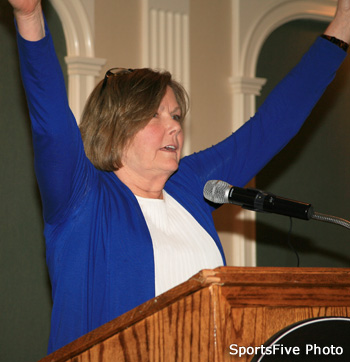 She finished by reviewing goal setting, and in particular, using "SMART" goals, which she stated should be written down at the beginning of the season and then evaluated as the season progresses. She suggested that the team should make a list of "Specific, Measurable, Agreed on, Realistic and Timely) goals. Next she suggested that the team member come up with tasks that lead toward the goals. Finally, the team should identify obstacles that might get in the way. In the end, she suggested, the team must find goals that everyone can agree on and can commit to.
She finished by reviewing goal setting, and in particular, using "SMART" goals, which she stated should be written down at the beginning of the season and then evaluated as the season progresses. She suggested that the team should make a list of "Specific, Measurable, Agreed on, Realistic and Timely) goals. Next she suggested that the team member come up with tasks that lead toward the goals. Finally, the team should identify obstacles that might get in the way. In the end, she suggested, the team must find goals that everyone can agree on and can commit to.
Michele's discussion about goal setting led right into the second work session led by Karen Simon. Each team group used SMART goals to work on the issue that they selected earlier.
The next speaker was William Smith Women's Head Coach Pat Genovese who has led the Herons to twenty-nine winning seasons and sixteen trips to the NCAA tournament. She is a three-time National Coach of the Year and had a career record of 385-158-1 and until 2013 was the only person to have led the women's lacrosse team at William Smith. A member of the National Lacrosse Hall of Fame, class of 2009, she has many accolades and awards. She has coached ninety-four All Americans and had four National Players of the year.
Genovese began her talk by congratulating the student-athletes who were in attendance. She then had everyone stand up, move around and "roar" before she continued.
"To be a leader, you have to know yourself. You have to be accurately defining who you are now and where you want to be... Leadership is getting players to believe in you." Genovese told the players that there are many expectations for leaders. She included being "on call and on the ball", advised them that they can take no shortcuts, that they must build their team and that they need to support their teammates when there are tough times.
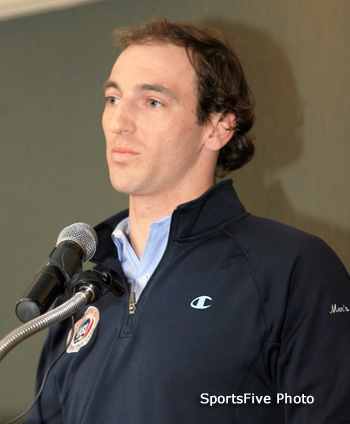 She spent a good deal of time talking about getting enough quality sleep. "You've got to take care of primary things... eating, hydrating and a sleep schedule, but as a team leader you have to be sharp, you have to be alert." She suggested trying to set up a schedule with their teammates in which the cell phones and the computers are turned off by ten o'clock so that there are no interruptions.
She spent a good deal of time talking about getting enough quality sleep. "You've got to take care of primary things... eating, hydrating and a sleep schedule, but as a team leader you have to be sharp, you have to be alert." She suggested trying to set up a schedule with their teammates in which the cell phones and the computers are turned off by ten o'clock so that there are no interruptions.
Genovese talked about creating a simple, clear plan, with rules and values that are reinforced every day. She spoke about the importance of communication including listening to players, talking with coaches, not through texting and tweets, but face-to-face. "Your communication is the most important tool that you have.... Showing that you care is probably the most important thing."
Genovese shared the thoughts of psychologist Bruce Tuckman, who wrote in 1965 about the stages of the growth of a team that included forming, storming, norming and performing.
After adding some pointers about successful teams, Genovese ended with quotes from Pat Summit and Michael Jordan. She then ended with a charge to the participants. "Now just remember that it is a journey. It is a privilege to be here. It is a privilege to play. You play in the greatest game, I think, on earth. Take advantage of the offerings you have before you because when it's gone, it's gone."
Karen Simon finished up with the groups working on their project goals. She asked each group to come up with five action steps to reach their goal.
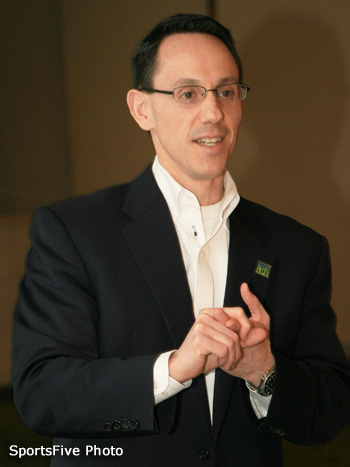 The last speaker in the program was Stephen Berger, Director of the Men's Game for US Lacrosse, who flew in from Baltimore for the symposium. An accomplished player in High school in Maryland, and then at Washington College and the pros, he said that unlike the other presenters, we would make his remarks from the player's perspective. He started with the concept that every day a leader has to earn his position. "I learned from the very beginning the right way to play the game, both on and off the field."
The last speaker in the program was Stephen Berger, Director of the Men's Game for US Lacrosse, who flew in from Baltimore for the symposium. An accomplished player in High school in Maryland, and then at Washington College and the pros, he said that unlike the other presenters, we would make his remarks from the player's perspective. He started with the concept that every day a leader has to earn his position. "I learned from the very beginning the right way to play the game, both on and off the field."
Later, as a small player with a great deal of desire, his college coach would say of him, "You have heart, and heart is what a leader needs."
Another needed element as both a leader and an athlete is work ethic. Even today, "I will never let someone outwork me... It's about being surrounded by a sport that has given me opportunities I couldn't ask for and wouldn't be able to do without the game."
"Leadership doesn't just happen. You have to work at it", he said before closing with two thoughts. He encouraged each player to take back at least three ideas from the many that were presented at the symposium. "Try to separate yourselves as individuals but also as leaders within your group. You are here for a reason."
The law firm of Connors & Ferris sponsored the event and Mike Simon introduced Greg Connors as a high school baseball player from Hornell, who picked up lacrosse in college. Connors made some brief remarks that included things that he learned from his high school coaches who supported parents and then were supported by them. He thanked the coaches in the audience and then told the students that "everything you learned, everything you heard today, everything your coaches want to teach you about discipline, adversity, overcoming the hard things, that's what it takes."
Perhaps, summing up the day, Connors said, "What will make you a success in life, are the skills and the traits that you learned here today."
2025 Hall of Fame Dinner...
McQuaid Jesuit Looking for Coaches...
Hall of Fame Dinner on November 14th...
06/14 - Forks-8 - PY-11
06/14 - GC-14 - CA-5
06/11 - Pen-6 - WG-16
06/11 - CA-17 - CBA-11
06/11 - PY-17 - OFA-10

